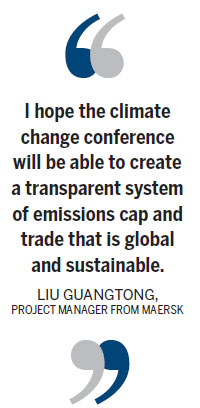The young are doing their bit, too
By Cecily Liu (China Daily Africa) Updated: 2015-11-20 08:09Youth put heads together in world conference where climate change is a key issue
For Senlin Deng, manager of a L'Oreal cosmetics factory in Suzhou, Jiangsu province, protecting the environment and minimizing emissions relating to his plant is just as important as profitability.
"Living in China and witnessing the amount of pollution and extreme weather changes, I feel that the environment is so important," the 29-year-old says.
|
A discussion during the One Young World 2014 Forum in Dublin. Chinese speakers for this year's forum say young people in the country care a lot about environmental protection and that many are keen to take steps to help in their own way. Provided to China Daily |
"Working in my job I realize that factories have a very big impact on the environment, so I try to do my best to introduce environmentally friendly methods to manage my factory."
In eight years working for L'Oreal, Deng has gained experience in China and elsewhere. Frequent opportunities to visit other factories have allowed him to think about how to improve practices in China, he says.
He has worked at several factories, and has pushed all of them to the top standard for environmentally friendly construction.
"To build a more environmentally friendly factory entails a lot more investment financially and in human resources during the construction period. Often companies don't invest in such initiatives, but we decided to meet higher standards because efficiency will bring financial benefits later on."
Deng was due to be one of the young leaders at this year's One Young World conference in Bangkok between Nov 18 and 21. Hailed as the youth version of the Davos World Economic Forum, the conference brings together people under the age of 30 who have demonstrated leadership qualities in their fields to discuss ideas, of which climate change is a key topic this year.
"I really look forward to sharing some of my practices in implementing environmentally friendly initiatives at work with people of my age, and then listen to their ideas, which I'm sure will be very inspiring," Deng says.
Today's young people in China are ever more attuned to the importance of environmental protection, and many are keen to take steps to help in their own ways, he says.
The difficulty is often finding out the best method to contribute, and Deng says this is a process he has explored for many years.

"At first I was confused, but after observing much of how my colleagues in other countries are taking concrete steps to reduce climate change at work, I believed I could do the same."
After observing best practices abroad, Deng has taken the initiative to document the PM10 and PM2.5 levels of every emitting channel of his factories, because from experience he realized a lot of the chemicals used in manufacturing beauty products are absorbed by the air, so to monitor these emissions is a key way to create reduction targets.
Another project he is planning to collect data relating to the water consumption of L'Oreal products by taking into account consumption in the supply chain.
"By collecting these data we can encourage our raw material suppliers to act in a more responsible way, so the overall environmental benefit is increased."
Like Deng, Liu Guangtong, 30, a project manager for the Danish logistics company Maersk, is a young professional implementing environmentally friendly practices in his workplace.
As a procurement project manager, Liu says he always thinks about the impact on the environment of the products and raw material that he buys.
"At Maersk I learned to question the emissions impact of my suppliers' products, and often I would explain to them the environmental consequences of different products. By making them understand that we prefer the more environmentally friendly version, even at higher costs, they supply these to us."
In addition, Liu's team is involved in projects in conjunction with suppliers to develop more environmentally friendly technology. One example is to develop electric vehicles to be used at ports that would replace petrol and diesel vehicles with the same functions. These have already been developed, and many ports in China have ordered them.
Another example is to develop containers to transport goods with plastic floors, so that the plastic can be recycled and reused.
Liu says he developed a keen interest in climate change issues because he has studied and worked abroad in many countries, including Australia, the United Kingdom, France and Singapore, and the experience has allowed him to understand the importance of combating climate change in China.
Liu was to give a speech on climate change representing China during the Bangkok forum, in which he was to call on countries internationally to set binding targets on climate change and adhere to these targets by enforcing strict measures.
"I don't want China and other countries at the climate change conference in Paris to discuss who should take the blame for climate change, as I think countries should all do their part to fulfill these targets."
They should set targets within the Intended Nationally Determined Contributions framework because it takes into account many factors, including historical emissions and a country's or region's stage of development, so that it provides a fair and level playing field for all countries and is legally binding, he says.
"I hope the climate change conference will be able to create a transparent system of emissions cap and trade that is global and sustainable," Liu says. "China has already announced that it will start its own carbon emissions cap and trading market in 2017, which is very positive, and as other countries follow suit we can establish a global system that is accountable and works efficiently."
Liu says within this cap and trade system there should be incentives for businesses to innovate for efficient technology to reduce the costs of production. Developed countries could also fund and support emerging economies to implement environmentally friendly practices.
He says he wanted to give the speech so that the world would understand that young people from China care greatly about the environment and that they are keen to take action to improve the environment.
Like Deng and Liu, William Luk, of Hong Kong, is a young manager who cares deeply about the environment. As an associate for Standard Chartered bank, he has been involved in charity work helping less privileged children in China.
He helps the bank's charity effort to organize books, toys and mooncakes donated by his colleagues.
"While the more obvious objective of these donation campaigns is to redistribute them to the needy and share the joy, the more important objective is to raise awareness of our excesses," the 24-year-old says.
"For example, Hong Kong, a city of 7 million people, threw away 2 million mooncakes in 2012. As many of our colleagues receive mooncakes from friends, family and clients, the annual donation campaign aims to remind them of how unnecessary this waste is."
Luk says he is optimistic about the Paris conference and hopes various governments can reach a legally binding agreement.
"I am hopeful that a universal agreement with substantial action points to keep global warming below the critical threshold of 2 degrees is likely. Such actions will likely include emissions cuts, increased investment and implementation of renewable energy for both developed and developing nations, and a framework for continuous talks and monitoring.
"One challenge is determining the extent to which the agreement is legally binding. That will be key to the effectiveness of the treaty and, consequentially, our survival."
cecily.liu@mail.chinadailyuk.com
(China Daily Africa Weekly 11/20/2015 page14)





